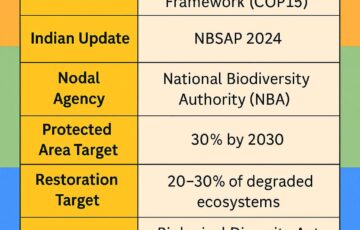Food Safety Laws in States
Why in the News?
- The Uttar Pradesh government issued orders requiring food establishments to display names and addresses of operators, proprietors, and key personnel.
- Similar directives were passed earlier in UP and Uttarakhand but were stayed by the Supreme Court in July 2023.
- Himachal Pradesh briefly considered similar rules but later distanced itself from them.
Current Requirements Under FSSAI:
- The Food Safety and Standards Authority of India (FSSAI) regulates food safety through the Food Safety and Standards Act, 2006 (FSSA).
- All food businesses must either register or obtain a license from the FSSAI.
- Petty Food Manufacturers (small businesses, vendors) must display their registration certificate and photo ID.
- Larger businesses are required to display their FSSAI license.
- Violations of the FSSA can lead to penalties, including imprisonment or fines up to Rs 5 lakh for operating without a license (Section 63).
State Government Powers Under FSSAI:
- States can make rules under the FSSA with consultation and approval from the Food Authority (Section 94).
- State Commissioners of Food Safety, appointed under Section 30, are responsible for enforcing the FSSA.
- States can propose additional rules as long as they align with the Act’s objectives and receive necessary approvals.
Penalties for Non-Compliance:
- FSSAI can issue an Improvement Notice to food operators who violate provisions of the FSSA.
- Failure to comply may lead to suspension or cancellation of the operator’s license.
- Penalties for non-compliance under Section 58 can include fines up to Rs 2 lakh, with harsher punishments for repeat offenders.
Challenges to State Directives:
- The Supreme Court stayed similar orders in July 2023 because the police lacked authority under the FSSA.
- Petitioners argued that orders violated Article 15(1) (non-discrimination on religious grounds) and Article 19(1)(g) (right to profession), suggesting they could lead to economic boycotts and discrimination.
Purpose of New Directives:
- The UP government argues that these measures aim to ensure public health and food safety,
- citing incidents of food adulteration across the country.
- Other directives include installing CCTV cameras in eateries and conducting verification campaigns.
About FSSAI: Key Information and Functions
- Established under: Food Safety and Standards Act, 2006
- Administrative body: Ministry of Health & Family Welfare
- Headquarters: Delhi
- Consolidation of Acts: Merged previous laws like Prevention of Food Adulteration Act, 1954 and others.
- Effective Operation: Began in 2011 after notification of rules.
- Key Processes:
- Set standards for food products.
- Develop safe food practices.
- License food businesses.
- Ensure compliance via inspections.
- Test food for safety and standards.
- Provide training and build capacity.
- Conduct citizen outreach programs.
Associate Article
https://universalinstitutions.com/e-commerce-sites-told-to-classify-food-items-correctly/




